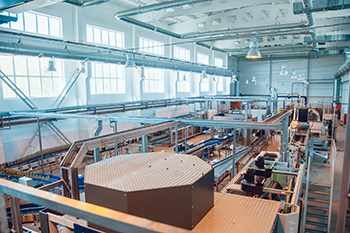Science to the industry’s rescue
VIK VITHLANI, sales director, Mena (Middle East & North Africa), flooring, at Sherwin-Williams Protective & Marine Coatings, examines how science and technology is finding solutions to the flooring industry’s woes after disruption in the raw materials supply chain.
01 April 2018
Flooring systems have always had to address issues such as the lengthy drying and sticking processes, associated costs from loss of activity, odours during application, and environmental impact.
To overcome these, many flooring systems traditionally rely on the use of a resin-based system called methyl methacrylate (MMA). Acrylic resins utilising MMA form a variety of industrial and commercial flooring systems, and are known for their fast cure speed. This has major benefits, such as allowing fast return-to-service (as little as one or two hours) and less time on site for applicators.
But MMA resins are not without their problems. Applicators report the resin can, in fact, cure too fast, resulting in issues with the finished floor, due to the potlife of the mixed product simply not leaving enough time for installation. Hence, highly-trained teams are needed to prepare the sub-floor and install the flooring correctly, and problems are often reported after installation.
 |
|
Vithlani |
MMA resins rely on monomers – molecules that can be bonded to other identical molecules to form a polymer – as a key raw material ingredient.
Another factor is that environmental issues and shutdowns of a number of MMA-producing plants around the world, have disrupted the supply chain and prices have increased. Simply put, there is not enough MMA to go around, creating huge allocation issues in terms of supply. This has been escalating for at least two years, and prices are at an all-time high, with availability at its lowest.
In addition, the curing of MMA resins is done with the addition of the benzoyl peroxide catalyst (BPO) powder hardener. To add to woes, this product also remains in global shortage following the fire in a major BPO producer in China two years ago.
Risky business
The use of both MMA and BPO products bring with them well-known issues. The concentrated version of BPO, used as a catalyst with MMA resins, is explosive, so extreme care must be taken when transporting and handling it. Global shipping rules dictate that BPO cannot be shipped together with MMA resins, and require special shipping methods.
BPO is also usually supplied in bags, and need to be weighed on-site before mixing. This can potentially result in human error if higher or lesser amounts are mixed. An increased amount of BPO will not only further increase the curing time, but will also reduce the mechanical strength properties.
Furthermore, MMA-based systems emit an extremely high odour and the area being prepared must be properly ventilated as the polymer hardens. While MMA is not described as acutely toxic by the World Health Organisation (WHO), it does describe it as a mild skin irritant with the potential to cause ‘skin sensitisation in susceptible individuals’. Occupational asthma has also been reported. This odour also brings with it a high risk of tainting, a major issue depending on the sector being supplied.
Science to rescue
There are, however, other options available for MMA-based resins. Having conducted research and listened to the market, Sherwin-Williams Protective & Marine Coatings has developed the Elladur flooring range.
Elladur is a polyaspartic resin-based system, and has fast curing properties compared to alternative epoxy or polyurethane resin-based systems. It does not rely on monomer technology as a raw material and, therefore, remains unaffected by the global shortage and dramatic price increases.
Polymerisation (curing) of Elladur resins is achieved without BPO – instead using a liquid hexamethylene diisocyanate (HDI) hardener which does not pose the same risks as BPO and is not subject to the same global shortages.
Elladur is also supplied in factory-controlled units, as opposed to bags, so there is no requirement to weigh components on-site prior to mixing – removing the risk of human error.
Whilst Elladur and polyaspartic resins, in general, cure fast and at low temperatures, they do not cure as quickly as MMA which means installers have the time to perfectly finish the application of the floor in question. Elladur, for instance, cures in around six hours, meaning general resin coating application teams can install the product with no issues.
Polyaspartic resin-based systems also have major health and environmental benefits. As a solvent-free, low-VOC (volatile organic compound) system, there is no odour, so no ventilation is required, and there is zero risk of tainting, even with food and beverage or pharmaceutical products being handled or manufactured in the area.
These flooring products also allow for a high build, and are also 100 per cent ultraviolet (UV) stable, as opposed to MMA-based flooring systems which have no UV properties.
Sherwin-Williams’ Elladur range includes Elladur SF clear and coloured materials, Elladur Deco FL fast-track decorative flake system, Elladur Deco BC using coloured quartz aggregates and Elladur LM for line markings.
Sherwin-Williams, an American Fortune 500 company in the general building materials industry, is also working towards meeting Building Research Establishment Environmental Assessment Method (Breeam) assessment for the range, providing a certified score of environmental sustainability while demonstrating compliance to best practice requirements. n



